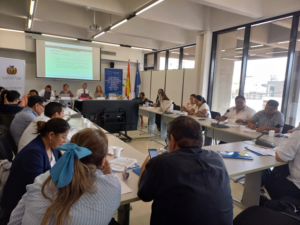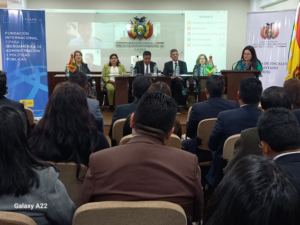
27/10/2023
Justice professionals from Spain and Bolivia have provided training to the Bolivian prosecutors' school on restorative justice with a human rights and gender perspective
Within the framework of the European project to combat drug trafficking in Bolivia, training has been carried out in collaboration with the Bolivian School of Prosecutors, aimed at prosecutors, on alternative solutions, early resolution, negotiation techniques, conciliation, mediation and restorative justice.

The training has been given by two international experts, Spanish magistrates, to which the Bolivian experience has been added through the participation of a conciliatory prosecutor in each of the Bolivian departments (Santa Cruz, Cochabamba, La Paz and Chuquisaca) and the director of the Specialised Prosecutor’s Office for Early Resolution. This joint participation has enriched the activity by giving a European and Bolivian vision to the proposal of alternatives to the current penitentiary regime in a country where the percentage of people deprived of liberty in pre-trial detention, without a final sentence, is between 60-70%.
Restorative justice has gained great relevance within the Bolivian Public Prosecutor’s Office, promoting the humanisation of justice through the accountability of offenders, the reparation and restitution of violated rights to victims and even involving the community in the resolution of the conflict. This activity, with a clear focus on human rights, aims to reverse the current model of prison regime where there is a large overcrowding of prisons, where the management is carried out by the persons deprived of liberty, creating a model of self-management that further exacerbates social and economic differences.
Throughout these trainings, the tools available to members of the Public Prosecutor’s Office (conciliatory prosecutors, prosecutors and juvenile criminal justice prosecutors) have been reinforced in order to provide better responses to crime, and timely and appropriate responses in order to provide real access to justice for all citizens. The objective has been to develop skills for the performance of their functions that can contribute to access to agile, efficient and economic justice for the entire Bolivian population, and that provides an adequate response to victims, with a focus on human rights and a gender perspective.
The project is promoting this victim-centred approach that prioritises protection, access to justice and reparation and the restoration of victims’ rights. This approach seeks to avoid re-victimisation processes and to promote, for example, economic reparation for victims.

In the development of case studies based on strategies and techniques of negotiation in criminal matters and restorative justice, which have been part of these trainings, complementary tools have been provided on new models of justice and conflict resolution. These will make it possible to better and definitively resolve the underlying conflicts that lie behind criminal offences, to tackle excessive judicialisation, promoting reintegration and avoiding recidivism, with a restorative and preventive approach, and taking the victims into account in a very special way.
The methodology applied has been that of a Trainer of Trainers to facilitate the replication of the tools and skills acquired in these trainings. Therefore, in addition to including practical workshops and case studies, training tools such as slides, videos and complementary documentation have been provided and uploaded to the platform of the Prosecutors’ School so that participants in the activities can access them and replicate the training received.


